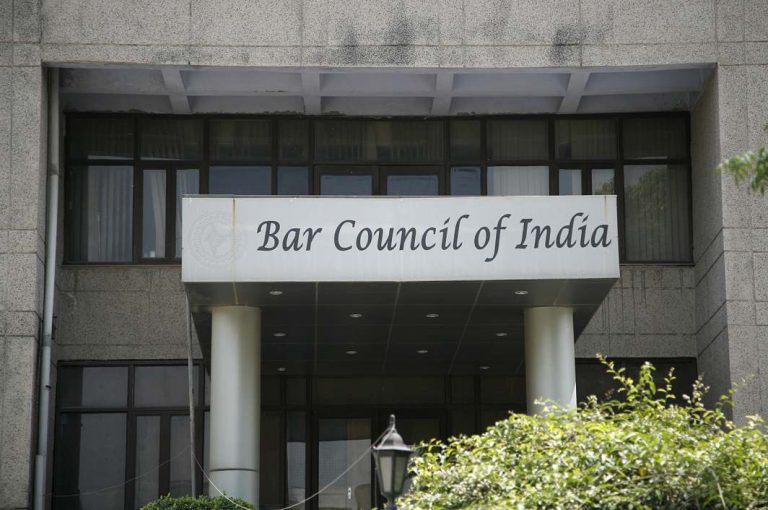
Above: Bar Council of India/Photo: Anil Shakya
A petition filed before the Supreme Court seeking a ban on MPs and MLAs practising in courts has triggered serious debate in legal circles
~By Justice Sreedhar Rao
The petition filed by Ashwini Kumar Upadhyay before the Supreme Court of India seeking a ban on lawmakers practising in courts has stirred a hornets’ nest and opened up a serious debate within legal circles. Section 49(1)(c) of the Advocates’ Act, 1961, empowers the Bar Council of India (BCI) to enact rules for ensuring the standards of professional conduct and etiquette to be observed by advocates. The BCI Rules 47 to 51 lay down the dos and don’ts for maintaining the integrity and dignity of the profession.
- An advocate is prohibited from engaging in any business but he may be a sleeping partner in a firm which, in the opinion of the BCI, is not derogatory to the dignity and ethics of the profession.
- An advocate may be a director or a chairman of the board of directors of a company with or without a sitting fee, but shall not be a managing director or a secretary of a company.
- An advocate shall not be a full-time salaried employee of the government or under any person, including legal entities.
- The Supreme Court in one case had held that law officers cannot appear before the courts on behalf of their employers as they were full-time employees.
- An advocate can review parliamentary bills for remuneration, do press vetting for newspapers, but should not be employed full-time in broadcasting, journalism, teaching, and the like.
These restrictions were enacted at a time when the complexity of the issue in question was not contemplated.
The submission of the BCI before the Supreme Court was that it did not have any objection if advocates elected as members of parliament or state legislatures appeared in courts to practise law. However, it was submitted that if an advocate was a party to an impeachment motion, he shall not appear before that particular presiding judge. This submission of the BCI appears to be puerile, because in no case would an advocate moving an impeachment motion appear before such a judge and even otherwise, on the ground of personal bias, the judge would recuse himself. Hence, there appears to be no virtue or merit in the submission before the Supreme Court.
On the question of whether an advocate who is an elected member of parliament or a state legislature has a right to practise in courts, the submission of the BCI appears to be a hasty decision and not deliberated in depth, considering the conflict of duties of an elected office vis-a-vis the duties of a lawyer.
The legal profession demands absolute integrity and total devotion. Likewise, elected representatives in parliament and state assemblies also owe a duty to their constituencies which elected them. The MPs and MLAs should not merely do the job of law-making, but also bring to the notice of the House the problems of the people so that a debate is initiated to highlight the failure of the bureaucracy and political governance.
This aspect of their duty calls for regular visits to their constituencies. Be it a member of the Lok Sabha or Rajya Sabha or assembly or council, there is no difference in the duties and responsibilities towards the constituency they represent. The role of elected representatives needs total dedication towards the people of their constituency and not just attending Parliament or the assembly while in session.
The BCI seems to have glossed over the onerous and sacred duties and responsibilities of elected representatives towards parliament and assemblies which conflicts with the duties and responsibilities of an advocate. It should have invited a wide debate in legal circles before a final decision was taken in the matter for submission before the Supreme Court.
Article 84(c) empowers Parliament to make a law regarding qualifications for getting elected to the Rajya Sabha. Section 3 of the Representation of People Act, 1951, substituted by Act 40 of 2003 w.e.f. 28.8.2003, declares that “a person shall not be qualified to be chosen as a representative of any state or union territory to the Council of States unless he is an elector to the Parliamentary Constituency in that State or territory of India”. By Act 40 of 2003, an amendment was effected by substitution w.e.f. 20/8/2003 which deleted the requirement of being an elector to the parliamentary constituency in that state or territory and prescribed that he is an elector for the parliamentary constituency in India.
In the US, to be a member of the House of Representatives, one need not be a resident of the state which he represents. The residential/domicile qualification of the state becomes imperative since he/she is expected to represent the interest of the state concerned. The object of a bicameral parliament is to effectively guard the interests of states which do not have equal representation in the Lok Sabha.
When the unamended law was in vogue, it was difficult for political parties to bring their favourites to the Rajya Sabha, who are not electors of that state or territory. Many of the members nominated faced the risk of criminal prosecution for filing false declarations about residence or domicile. All the political parties in order to overcome the impediment employed political chicanery and dumped the law. It is time to weed out the arbitrary practice of law-making and the decisions of bar councils to maintain healthy practices of democracy.


